
Effective solutions are crucial in modern business, and project management tools are no exception. Project management tools are vital in keeping projects on track, streamlining workflows, improving teamwork efficiency, and ensuring successful project completion. They enable teams to easily plan projects, assign tasks, track progress, and meet deadlines.
Over the last decade, Project management software has transformed significantly due to technological advancements, cloud computing, and the demand for remote work. Key enhancements include real-time collaboration, mobile compatibility, advanced analytics, user-friendliness, and integration of Artificial Intelligence, leading to improved productivity and efficiency.
Let's explore the top 8 Project Management Tools to help you organize your team and projects in the most effective way.
Trello - Best for visual project management
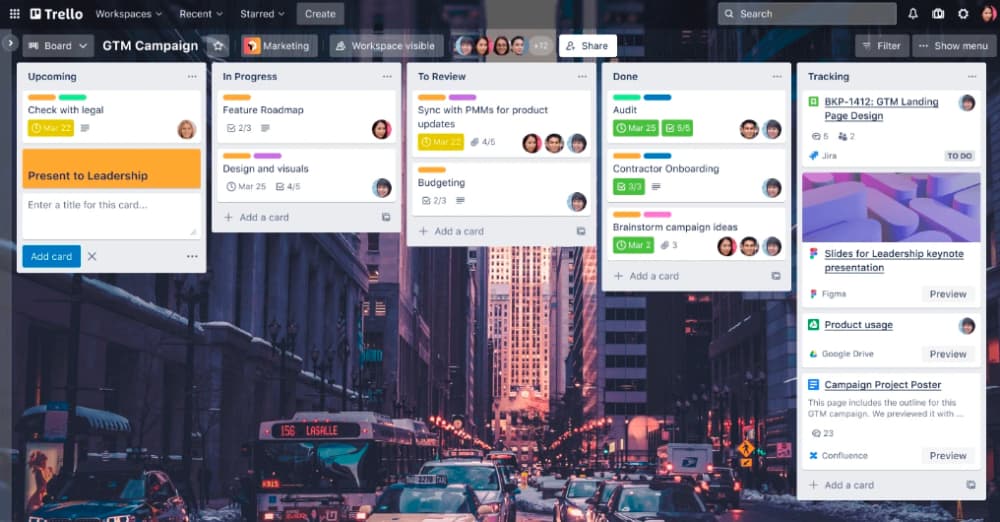
Trello, owned by Atlassian, is a user-friendly project management software featuring a Kanban board-style interface. With visual boards, columns, and cards, it's ideal for simple project management. Freelancers and small teams find it easy to use. Its drag-and-drop interface, akin to an online whiteboard with movable virtual Post-it notes, allows users to create, assign, and manage tasks easily. Trello is flexible, making it suitable for individual projects and ongoing workflows. Despite its simplicity, it handles task details, file attachments, due dates, checklists, and hyperlinks.
Pros:
- User-Friendly: Trello's card-based system is simple, highly visual, and intuitive for teams of all sizes.
- Flexibility: Users can customize boards, lists, and cards with unlimited Power-Ups (integrations).
Cons:
- Limited Project Features: Trello's simplicity may hinder its effectiveness for complex, large-scale projects with intricate requirements. Notably, it lacks built-in time tracking, but users can integrate third-party tools for this purpose.
- Overreliance on Cards: Heavy reliance on cards can lead to clutter, affecting visibility.
- Reporting and Analytics: Built-in capabilities are basic; advanced reporting may require third-party tools.
- Dependency Management: Trello doesn't inherently support dependencies between tasks, which can be a limitation for projects that require strict task sequencing.
- Free Plan: Unlimited cards, members, 10 boards/workspace, unlimited Power-Ups, 250 automated commands per month.
- Paid Plans: Start from $6 per user per month ($5 per month if billed annually), offering unlimited boards, custom fields, advanced checklists, and more.
Asana - Best for robust features
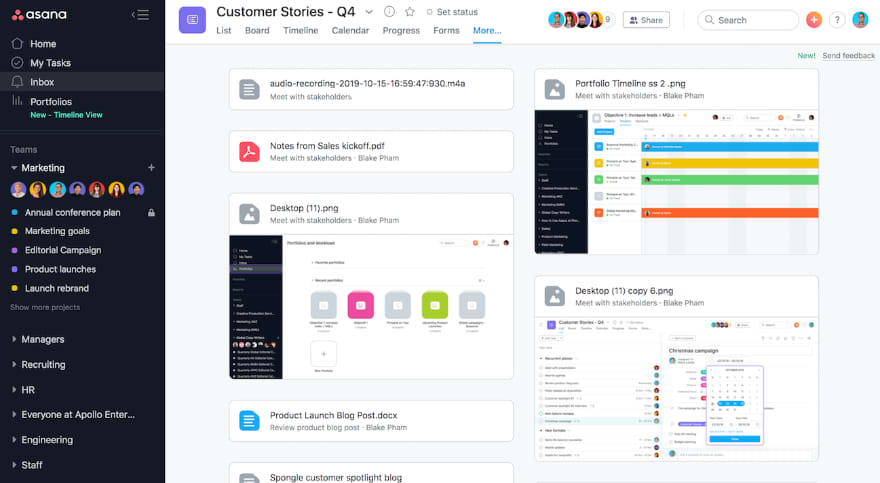
Asana stands out as a feature-rich project management solution covering planning, execution, and collaboration. It allows adding, rearranging, and completing tasks just like any other to-do list app, but with the added collaboration and organizational features necessary for effective teamwork. Its user-friendly tools allow for efficient project breakdown, prioritization, and progress tracking. With intuitive features like timelines and Gantt charts, Asana aids project visualization and planning. Its calendar view offers a visual overview of projects, team assignments, and deadlines. Its wide array of collaboration tools includes in-app chat and a built-in feedback feature, enhancing communication and review processes. Its built-in integration system reduces duplicate work and facilitates connections between complex projects, making it a preferred choice for both mid-sized organizations and large enterprises, especially those with remote teams.
Pros:
- Feature-Rich Platform: Comprehensive features cover planning, execution, and collaboration.
- Strategic Goal Setting: The platform allows users to set and track strategic goals, providing a comprehensive view of team performance.
- Agile Support: Asana supports agile methodologies, adapting to various project management approaches.
Cons:
- Pricing for Advanced Features: Advanced features are available in paid plans, potentially impacting budget-conscious users.
- Learning Curve: Some users may find a learning curve, especially with advanced features and integrations.
- Free Plan: Unlimited projects, tasks, and storage for up to 10 users, with 100+ free integrations.
- Premium Plans: Start at $13.49 per user per month ($10.99 per month if billed annually) with additional features like Gantt and timeline views, detailed reports, and upcoming AI.
Jira - Best for software development management using Agile methodology
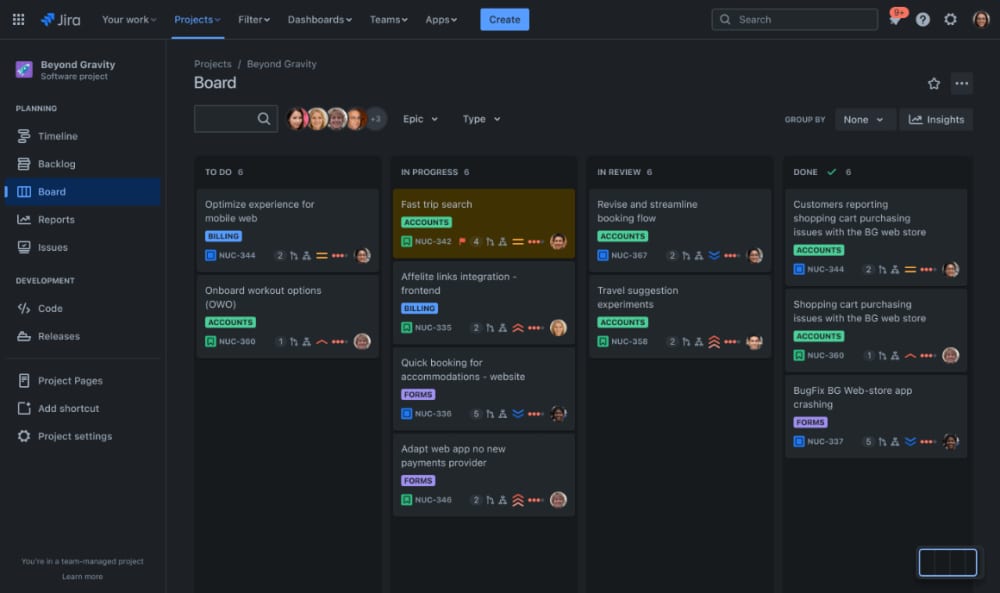
Jira, developed by Atlassian, is a powerful project management tool primarily used for issue tracking and project management in software development. It provides an extensive range of features designed specifically for software teams, covering issue tracking, sprint planning, and release management. Jira offers Timeline and Kanban views for efficient task management and visualization. The platform boasts over 1,000 integrations enhancing functionality and connectivity. Although initially designed for software development, Jira's flexibility allows it to be customized for various project management scenarios. While somewhat technical, it provides ample project management features for planning. Recently, Atlassian introduced Atlassian Intelligence empowering teams to automate tasks, providing insights, and fostering collaborative intelligence. Currently in early access, it invites users to join the waitlist. Will be accessible only under Premium Plan and higher.
Pros
- Powerful Tracking: Jira excels in issue tracking, providing a robust system to identify, prioritize, and manage tasks or problems.
- Customizable Workflows: Users can tailor workflows to match specific project management processes, making Jira adaptable to various needs.
- Agile Support: Jira supports Agile methodologies, offering tools like Scrum and Kanban boards for Agile project management.
Cons:
- Learning Curve: Jira's extensive features and customization can be challenging for new users.
- Technical Setup: The initial setup may require technical expertise, posing a challenge for less technology proficient teams.
- Costly for Growth: While a free plan is available, advanced features in premium plans can be expensive for smaller teams. As teams grow, the cost of premium plans may become significant for large organizations.
- Free Plan: Unlimited projects boards, up to 10 users, 2 GB of storage, and both Scrum and Kanban boards;
- Paid Plans: Start from $8.15 per user per month (with discounts available for annual subscription and for teams with 100+ members) for more granular user permissions, 250 GB of file storage, and more.
Monday.com - Best for ease of use
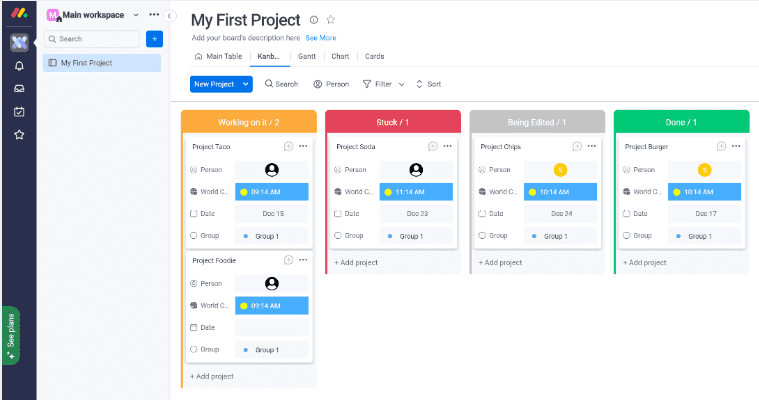
Monday.com is a project management platform for collaboration and workflow management. Beyond project management, Monday.com offers a robust collaborative toolkit, including flexible dashboards, CRM capabilities, product management, and guest view features for any kind of collaboration. It offers a user-friendly interface with clear labels, making navigation effortless. Monday.com supports resource workload and allocation, workflow automation, and provides 100+ templates for project initiation. The platform integrates with popular apps and is praised for its visual and easy-to-use interface, making it suitable for small businesses and startups.
Pros:
- Visual and User-Friendly Interface: Monday’s visually appealing and easy-to-use interface, providing an intuitive user experience.
- Workflow Automation: Monday.com incorporates a simple workflow automation system with pre-built templates and the ability to design custom automations. The platform provides a wide range of project templates (100+) for a quick start, allowing users to set benchmarks for their organization.
- Customizable Dashboards: Users can create customizable dashboards tailored to display relevant data, offering a personalized view of project information.
Cons:
- Focus on Project Tracking Over Planning: Monday.com leans more towards project tracking than comprehensive planning, potentially impacting its suitability for certain planning-intensive projects.
- Scalability Challenges: As workload, company size, or team collaborations increase, Monday.com's capabilities may have limitations in handling larger and more complex projects.
- Free Plan Limitations: Advanced features like Gantt charts are locked to mid-level plans.
- Free Plan: For up to 2 users, with up to 3 boards, unlimited docs, and 200+ templates.
- Paid Plans: Start from $10 per user per month ($8 per month for annual subscription), with unlimited boards, unlimited viewers and additional features catering to various business needs (minimum of three users required in each plan).
Wrike - Best for AI features
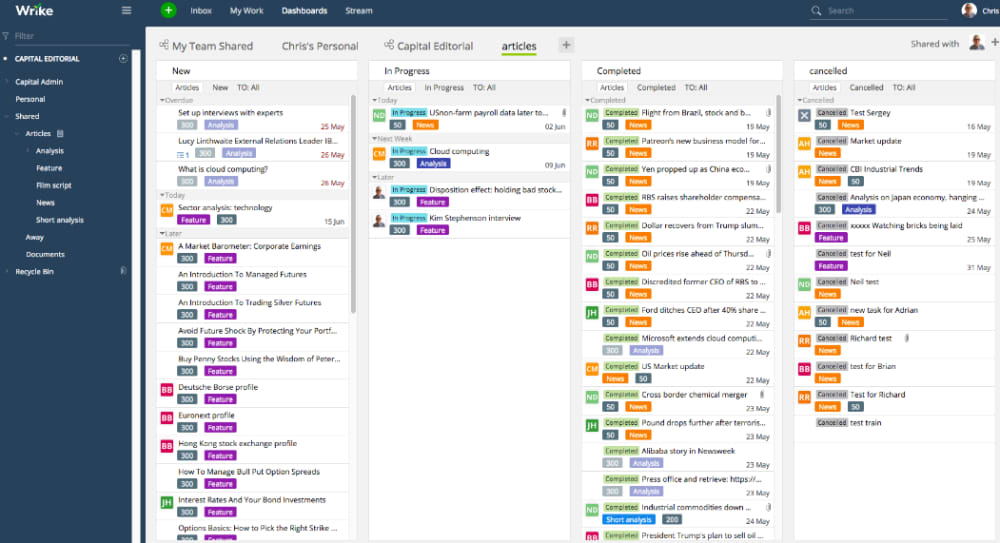
Wrike is a project management tool that combines task management, collaboration, and reporting features, providing valuable insights into project progress. With robust functionality, including Gantt charts and workload view, Wrike helps teams effectively manage their projects. Collaborators can be added to project boards without additional charges, allowing them to view progress, comment, and approve projects. Wrike boasts 400+ pre-built native integration options with popular tools like Asana, Airtable, HubSpot, and Slack, making it adaptable to different project management methodologies and team sizes. The platform also supports custom automations through its API. Wrike stands out with its AI function, available even under the free plan, that can perform "smart" actions such as search, replies, task suggestions, etc.
Pros:
- Built-in Forms: Wrike allows users to create custom forms to collect specific data related to tasks, projects, or other relevant information.
- Review Module: Wrike's review module enables teams to gather feedback on tasks, projects, or documents directly within the platform.
- AI Assistance: It stands out with AI functionality for smart actions such as searches, replies, and task suggestions.
Cons:
- Learning Curve: Complexity due to an extensive feature set may require time for effective use.
- Free Plan Limitations: Advanced features like time tracking, Gantt charts, and custom dashboards are available only in paid versions.
- Less Customizable: Lower-tier plans may have limitations on customization.
- Free Plan: Limited core features, unlimited projects and users.
- Paid Plans: Start at $9.80 per user per month and offer advanced features like Gantt charts, shareable dashboards, and more.
ClickUp - best for customized task views
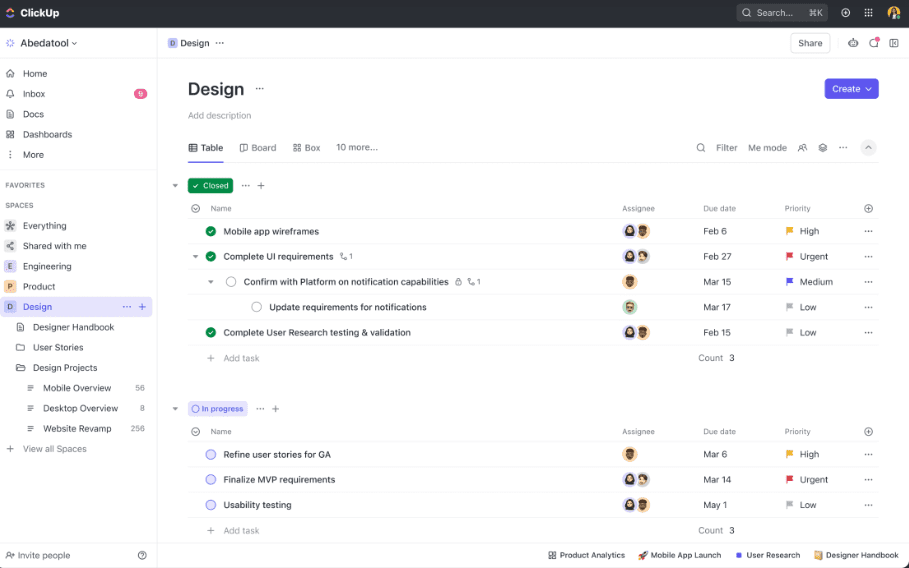
ClickUp is a robust project management solution allowing users to customize workflows to fit their specific needs. It provides different task views like List, Board, Calendar, Kanban view, Gantt charts, and mind maps as core features, even in its free plan. It offers four page views: Chat, presenting conversations alongside tasks; Doc, enabling teams to create and edit documents directly on the platform; and Embed, allowing the addition of apps and websites alongside tasks. ClickUp provides real-time reporting features, allowing users to track and analyze project progress as it happens. Users can generate reports based on various project metrics, team performance, and task statuses. The platform emphasizes collaboration with features such as comments, mentions, and integrates with 1000+ tools.
Pros:
- Versatile Work Views: ClickUp offers a variety of work task and page views, including List, Board, Calendar, Gantt charts, and mind maps, catering to diverse project management needs.
- Generous Free Plan: Even in its free plan, ClickUp provides access to core features, including various work views, making it accessible for small teams or individuals with basic project management requirements.
- ClickUp AI: The AI Toolbar facilitates improvements to content within the platform, making it versatile for writing, drafting emails, or outlining blog posts efficiently.
Cons:
- Learning Curve: Some users may experience a learning curve due to its extensive feature set.
- Time-consuming setup: Due to its extensive feature set and granular customization options, the onboarding process won't be as simple as with some other tools on the list, but the extra customization is worth it, especially when it's completely free.
- Free plan: Unlimited tasks for 1 user, up to 100MB of storage, and up to 60 uses of Gantt charts, mind maps, dashboards, and timeline views.
- Paid Plans: Start from $10 per user per month ($7 per user per month if billed annually) for unlimited custom fields, Gantt view, dashboards, and guests and permissions
Airtable - Best for building project databases
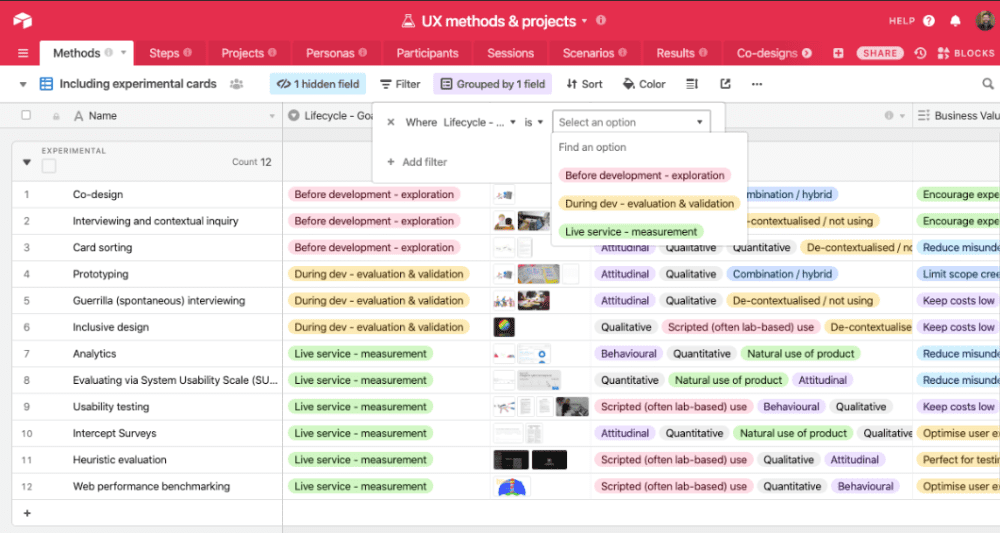
Airtable is an all-in-one collaboration platform that combines the simplicity of a spreadsheet with the complexity of a relational database with rich features like file attachments, Kanban card stacks, calendars, and reporting. It offers a flexible and customizable workspace where users can create databases, tables, and various views to manage information, projects, and workflows. Airtable's features include drag-and-drop functionality, real-time collaboration, customizable fields, and the ability to link between records. The strength of Airtable lies in its customization capabilities. Users can tailor the platform to meet specific needs, allowing for a highly personalized and efficient workflow. It caters to various use cases, from project management and content planning to event organization and customer relationship management. Airtable has built-in support for many popular apps and a robust API.
Pros:
- Flexibility and Customization: Airtable is the most customizable app on this list. Users can create custom databases and tables to suit their needs.
- Templates and Blocks: Airtable provides templates for different use cases, helping users get started quickly. Additionally, Blocks, which are modular apps within Airtable, add extra functionalities like charts, calendars, and more.
- Diverse Field Types: Airtable supports various field types, including text, attachments, checkboxes, dates, and more.
Cons:
- Learning Curve: For users unfamiliar with databases or spreadsheet-like interfaces, there might be a learning curve in understanding how to set up and use Airtable effectively.
- Limited Advanced Features: Airtable might lack certain advanced features compared to dedicated project management tools. It might not be as robust as some tools specifically designed for complex project management scenarios.
- Pricing for Advanced Features: While Airtable offers a free plan, some advanced features and higher usage limits are available in paid plans.
- Free plan: Up to 5 users, unlimited bases, 1,000 records per base, and 6 view options.
- Paid plans: start at $24 per user per month (20$ per month if billed annually) for 50,000 records per base, 20GB of attachments, Gantt and timeline view, and more.
Zoho Projects - best for budget-friendliness
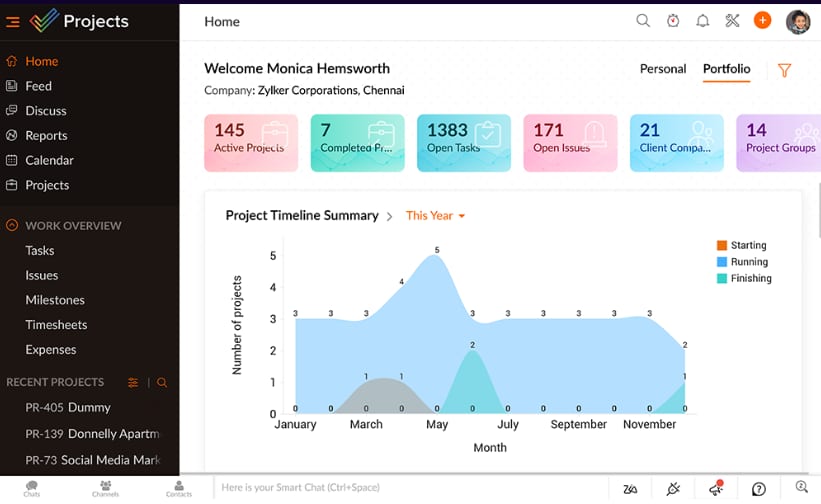
Zoho Projects stands out as the most cost-effective online project management solution on the list. It provides various project management features, including task management, task automation, time tracking, Gantt charts, and document management, making it suitable for diverse project needs. Users can customize workflows, fields, and views to align with their specific project requirements, providing flexibility for different project types. Zoho Projects also have milestones, dependencies, a Kanban board view, and a Calendar view. The platform facilitates collaboration through forums, chat, and feeds. It has a built-in direct message feature to make communication easier. Zoho Projects integrates with several other Zoho apps and various third-party applications, allowing users to connect their project management activities with other tools and services they use, enhancing overall efficiency.
Pros:
- Comprehensive Features: Zoho Projects offers a wide range of features, including task management, time tracking, document management, and more.
- Affordability: With its budget-friendly rates Zoho Projects stands out for its cost-effective pricing
Cons:
- Learning Curve: Users may experience a learning curve, especially if they are new to project management software or Zoho's ecosystem.
- Limited Free Plan: The free plan limits the number of users or projects, and users may need to upgrade to a paid plan for more extensive project management needs.
Pricing:
- Free plan: Up to 3 users, 2 projects, 5GB of storage space
- Paid plan: start at 5 EUR per user per month (4 EUR if billed annually) for unlimited projects, 20 Project Templates and 100GB of storage space, Project Gantt Chart, and Custom Views.
Reading time: 9 min 27 sec